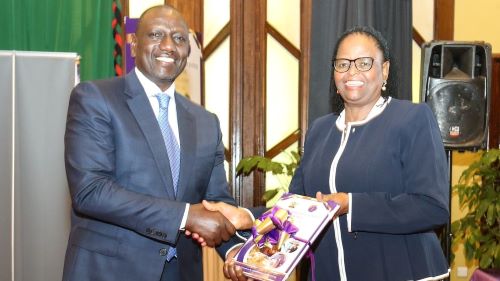Koome escorting the Judiciary to bed with Ruto

There is something inspiring about South Africa’s Constitutional Court. It is bold, audacious, and tenacious and oozes intellectual rigour. Its jurisprudence detests and reprimands political indiscipline and abuse of power.
This is understandably rooted in the South African independence Constitution that has a strong bent towards freedom and aggression on repressive behaviour.
It is a court that never misses a moment to enforce the Constitution and the rule of law without fear or favour.
It has made “unpopular” decisions with far-reaching consequences on the country’s democracy and constitutionalism.
When former President Jacob Zuma offended the Constitution, the court ordered Parliament to sack him. And when the ANC majority voted to protect Zuma, the court ruled that Parliament be sanctioned for failure to discipline him.
In a damaging ruling, the justices of the court in 2016 found that Zuma had broken the law by spending public funds to upgrade his private residence. Zuma had used taxpayers’ money to build a swimming pool, amphitheater, cattle shed, visitor centre and a chicken run which were not essential for his security.
He was ordered to refund the money but he refused. A subsequent ruling rebuked Zuma saying that in failing to comply with the remedial action, he “failed to uphold, comply and respect the Constitution.”
Then Chief Justice Mogoeng Mogoeng reminded Zuma that he was not above the law. The judge said that as president and Head of State, Zuma’s was a calling to the highest office in the land and, therefore, he was the first citizen of the country.
“The nation pins its hopes on him to steer the country in the right direction,” he said.
The ruling set the stage for his removal from office. The ANC found him a skunk and abandoned him. Faced with a no confidence vote, he resigned on February 14, 2018.
That is what a Judiciary with spine does.
A careful reading of the decisions by South African courts show that they tend towards protection of the ordinary citizens against political fiat and exploitation. They protect the rights of citizens, democracy and the rule of law.
That is why Kenyans should be alarmed at what looks like a carefully orchestrated scheme by the Executive to bully the Judiciary into submission.
With a Legislature that serves as a gleeful errand boy of the Executive, the Judiciary remains the only institution that can prevent what is steadily morphing into a Kenya Kwanza dictatorship and gravy train.
The others would have been the Directorate of Public Prosecutions, the Auditor General and the Controller of Budget. But given the prosecutor-assisted acquittals in the Gachagua and Arror-Kimwarer dams cases, who no longer doubts the fact that the office of the prosecutor is hopelessly captured by the Executive?
It is apparent that the Ruto administration wants to belittle courts and holders of independent offices—except the DDP which has become a valuable and unashamed lapdog for the Executive—for standing up to his illegal decisions. There was an ill-timed, tactless humiliation of budget chief Margaret Nyakang’o last year.
Throughout our history, the Executive has always desired a beggar for the Judiciary. A system whose independence can be swayed by the strings of a purse tethered at State House.
And if the recent begging visit to State House by Chief Justice Martha Koome is anything to go by, the Ruto administration is fast succeeding in turning the Judiciary into a pauper servant of the Executive. The CJ got out of the State House courts with a promise of money for leasing of cars and appointment of judges.
The meeting was a strategic coup to render the Judiciary another harlot of the Executive. And this is very dangerous. Kenyans should be vigilant that the only institution, the only bulwark they have against the excesses of politicians with bad manners, is being escorted to go to bed with the Executive—by the Chief Justice.
—The writer is the acting Managing Editor, People Daily












